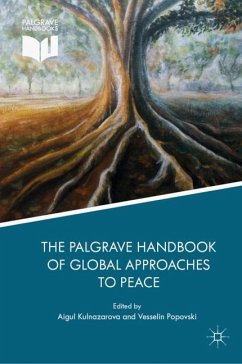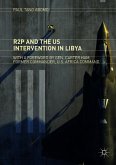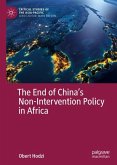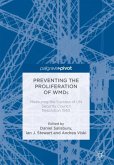The Palgrave Handbook of Global Approaches to Peace
Herausgegeben:Kulnazarova, Aigul; Popovski, Vesselin
The Palgrave Handbook of Global Approaches to Peace
Herausgegeben:Kulnazarova, Aigul; Popovski, Vesselin
- Gebundenes Buch
- Merkliste
- Auf die Merkliste
- Bewerten Bewerten
- Teilen
- Produkt teilen
- Produkterinnerung
- Produkterinnerung
With existing literature focusing largely on Western perspectives of peace and their applications, a global understanding of peace is much needed. Spurred by more recent debates and discourses that criticize the dominant realist and liberal approaches for crises in contemporary state- and peace-building, the contributors to this handbook emphasize not only the need to solve this eternal conundrum of humanity, but also demand-with the rise of increasingly more violent conflicts in international relations-the development of a global interpretive framework for peace and security. To this end, the…mehr
Andere Kunden interessierten sich auch für
![R2P and the US Intervention in Libya R2P and the US Intervention in Libya]() Paul Tang AbomoR2P and the US Intervention in Libya55,99 €
Paul Tang AbomoR2P and the US Intervention in Libya55,99 €![The End of China¿s Non-Intervention Policy in Africa The End of China¿s Non-Intervention Policy in Africa]() Obert HodziThe End of China¿s Non-Intervention Policy in Africa52,99 €
Obert HodziThe End of China¿s Non-Intervention Policy in Africa52,99 €![The Mass Appeal of Human Rights The Mass Appeal of Human Rights]() Joel R. PruceThe Mass Appeal of Human Rights44,99 €
Joel R. PruceThe Mass Appeal of Human Rights44,99 €![The Responsibility to Protect and a Cosmopolitan Approach to Human Protection The Responsibility to Protect and a Cosmopolitan Approach to Human Protection]() Samuel James WyattThe Responsibility to Protect and a Cosmopolitan Approach to Human Protection52,99 €
Samuel James WyattThe Responsibility to Protect and a Cosmopolitan Approach to Human Protection52,99 €![The Southern African Development Community and Law The Southern African Development Community and Law]() Mkhululi NyathiThe Southern African Development Community and Law95,99 €
Mkhululi NyathiThe Southern African Development Community and Law95,99 €![The Governance of Private Security The Governance of Private Security]() Marco BoggeroThe Governance of Private Security95,99 €
Marco BoggeroThe Governance of Private Security95,99 €![Preventing the Proliferation of WMDs Preventing the Proliferation of WMDs]() Preventing the Proliferation of WMDs37,99 €
Preventing the Proliferation of WMDs37,99 €-
-
-
With existing literature focusing largely on Western perspectives of peace and their applications, a global understanding of peace is much needed. Spurred by more recent debates and discourses that criticize the dominant realist and liberal approaches for crises in contemporary state- and peace-building, the contributors to this handbook emphasize not only the need to solve this eternal conundrum of humanity, but also demand-with the rise of increasingly more violent conflicts in international relations-the development of a global interpretive framework for peace and security. To this end, the present handbook examines conceptual, institutional and normative interpretive approaches for making, building and promoting peace in the context of roles played by state and non-state actors within local, national, regional, and global units of analysis.
Produktdetails
- Produktdetails
- Verlag: Palgrave Macmillan / Springer International Publishing / Springer, Berlin
- Artikelnr. des Verlages: 978-3-319-78904-0
- 1st ed. 2019
- Seitenzahl: 804
- Erscheinungstermin: 4. Januar 2019
- Englisch
- Abmessung: 241mm x 160mm x 49mm
- Gewicht: 1336g
- ISBN-13: 9783319789040
- ISBN-10: 331978904X
- Artikelnr.: 51396209
- Verlag: Palgrave Macmillan / Springer International Publishing / Springer, Berlin
- Artikelnr. des Verlages: 978-3-319-78904-0
- 1st ed. 2019
- Seitenzahl: 804
- Erscheinungstermin: 4. Januar 2019
- Englisch
- Abmessung: 241mm x 160mm x 49mm
- Gewicht: 1336g
- ISBN-13: 9783319789040
- ISBN-10: 331978904X
- Artikelnr.: 51396209
Aigul Kulnazarova is Professor of International Relations and International Law in the School of Global Studies at Tama University, Japan. Vesselin Popovski is Professor and Vice Dean in the School of Law, as well as Director of the Centre for UN Studies, at Jindal Global University, India.
1. Framework for Global Approaches to Peace: An Introduction.- 2. Cosmopolitan Paths to Peace.- 3. Peace, R2P and Public Goods Theory.- 4. Gandhism and Peace.- 5. Feminist Continua in Peace and Conflict Studies.- 6. The Liberal Peace: Challenges to Development, Democracy and Soft Power.- 7. Human Security and the Socialization of Peace.- 8. Singapore's Small State Domestic Peacemaking: "Quiet under the Banyan Tree".- 9. Peace in Rwanda: Balancing the ICTR and "Gacaca" in Postgenocide Peacebuilding.- 10. Operationalizing Positive Peace: Canadian Approaches to International Security Policy and Practice.- 11. Russian Approaches to International Peace, Security and Institutions: Debating Within IR Schools.- 12. Reframing the Principle of Noninterference: Reflections of Chinese School Debates and Beijing's Approach to Peace.- 13. Japan's Thorny Path to Peace: Past,Present and Future.- 14. Building Peace Through Ubuntu in the Aftermath of Electoral Violence in Divided African Societies.- 15. Did Colombians Really Say "No" to Peace?: A Grassroots Peace Activism Versus Top-down Approach.- 16. Peace in Europe: The Role of the European Union in Peacebuilding and Security.- 17. Which "ASEAN Way" Forward?: Southeast Asian Perspectives on Peace and Institutions.- 18. A Latin American Approach to Peace: The Case of MERCOSUR.- 19. The African Peace and Security Architecture: An African Response to Regional Peace and Security Challenges.- 20. Official Discourses on Peace and Security in Post-Soviet Central Asia.- 21. International Women's Organizations, Peace and Peacebuilding.- 22. The Role of Religious Institutions: Peace in Eastern Orthodoxy.- 23. The OECD Development Assistance Committee and Peace: Instituting Peace by Economic Means.- 24. The UN Security Council and Responsibility to Protect as Global Approach to Prevent Mass Atrocities.- 25. Peace Process, International Organizations and the "Kurdish Question".- 26. The Role of International Organizations in Peace and Reconciliation in Kenya.- 27. Transnational Governance and Peace Processes: The Case of the UN and ICC in Colombia.- 28. Peace Institutions: Gandhism, Conflict Solution, Lifting the Bottom Up.- 29. Toward Engendered-Sustainable Peace to End Patriarchal Violence.- 30. Transitional Justice: Between Peacebuilding and Reconciliation.- 31. Peace, Politics and Religion.- 32. Approaching Peace Visually: Global Imaginaries and Narratives of Everyday Peacebuilding.- 33. In Search for Peace in the Arctic.- 34. International Norms and Future Peacebuilding.- 35.The Global Approaches and the Future of Peace Research.
1. Framework for Global Approaches to Peace: An Introduction.- 2. Cosmopolitan Paths to Peace.- 3. Peace, R2P and Public Goods Theory.- 4. Gandhism and Peace.- 5. Feminist Continua in Peace and Conflict Studies.- 6. The Liberal Peace: Challenges to Development, Democracy and Soft Power.- 7. Human Security and the Socialization of Peace.- 8. Singapore's Small State Domestic Peacemaking: "Quiet under the Banyan Tree".- 9. Peace in Rwanda: Balancing the ICTR and "Gacaca" in Postgenocide Peacebuilding.- 10. Operationalizing Positive Peace: Canadian Approaches to International Security Policy and Practice.- 11. Russian Approaches to International Peace, Security and Institutions: Debating Within IR Schools.- 12. Reframing the Principle of Noninterference: Reflections of Chinese School Debates and Beijing's Approach to Peace.- 13. Japan's Thorny Path to Peace: Past,Present and Future.- 14. Building Peace Through Ubuntu in the Aftermath of Electoral Violence in Divided African Societies.- 15. Did Colombians Really Say "No" to Peace?: A Grassroots Peace Activism Versus Top-down Approach.- 16. Peace in Europe: The Role of the European Union in Peacebuilding and Security.- 17. Which "ASEAN Way" Forward?: Southeast Asian Perspectives on Peace and Institutions.- 18. A Latin American Approach to Peace: The Case of MERCOSUR.- 19. The African Peace and Security Architecture: An African Response to Regional Peace and Security Challenges.- 20. Official Discourses on Peace and Security in Post-Soviet Central Asia.- 21. International Women's Organizations, Peace and Peacebuilding.- 22. The Role of Religious Institutions: Peace in Eastern Orthodoxy.- 23. The OECD Development Assistance Committee and Peace: Instituting Peace by Economic Means.- 24. The UN Security Council and Responsibility to Protect as Global Approach to Prevent Mass Atrocities.- 25. Peace Process, International Organizations and the "Kurdish Question".- 26. The Role of International Organizations in Peace and Reconciliation in Kenya.- 27. Transnational Governance and Peace Processes: The Case of the UN and ICC in Colombia.- 28. Peace Institutions: Gandhism, Conflict Solution, Lifting the Bottom Up.- 29. Toward Engendered-Sustainable Peace to End Patriarchal Violence.- 30. Transitional Justice: Between Peacebuilding and Reconciliation.- 31. Peace, Politics and Religion.- 32. Approaching Peace Visually: Global Imaginaries and Narratives of Everyday Peacebuilding.- 33. In Search for Peace in the Arctic.- 34. International Norms and Future Peacebuilding.- 35.The Global Approaches and the Future of Peace Research.








